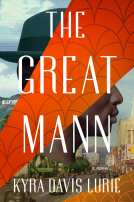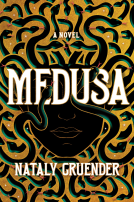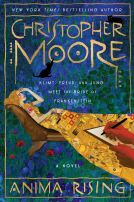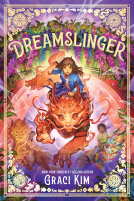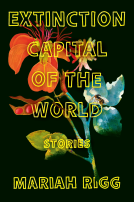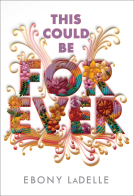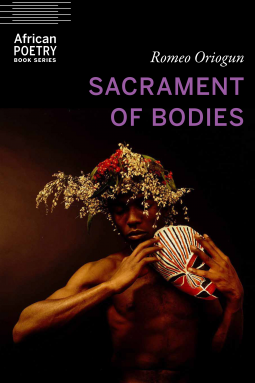
Sacrament of Bodies
by Romeo Oriogun
This title was previously available on NetGalley and is now archived.
Send NetGalley books directly to your Kindle or Kindle app
1
To read on a Kindle or Kindle app, please add kindle@netgalley.com as an approved email address to receive files in your Amazon account. Click here for step-by-step instructions.
2
Also find your Kindle email address within your Amazon account, and enter it here.
Pub Date Mar 01 2020 | Archive Date Mar 31 2020
Talking about this book? Use #SacramentofBodies #NetGalley. More hashtag tips!
Description
2021 Lambda Literary Awards Finalist
In this groundbreaking collection of poems, Sacrament of Bodies, Romeo Oriogun fearlessly interrogates how a queer man in Nigeria can heal in a society where everything is designed to prevent such restoration. With honesty, precision, tenderness of detail, and a light touch, Oriogun explores grief and how the body finds survival through migration.
Available Editions
| EDITION | Other Format |
| ISBN | 9781496219640 |
| PRICE | $17.95 (USD) |
| PAGES | 78 |
Links
Featured Reviews
 Mack P, Reviewer
Mack P, Reviewer
I still don't know much about poetry, even after writing some lengthy essay. I requested this ARC more or less because I want to read more poetry, more queer poetry specifically, and because I didn't want my semester in African Literature to be in vain.
I know enough about poetry to say that it's good when you stay awake until 1:30am to finish the collection in one go. Poetry is good when you are grabbed and held in place by an emotion you can't put into words, because the that would mean reciting the poem back at itself again. Or when you set out to highlight your favourite passages and end up with neon yellow pages
 Toni T, Reviewer
Toni T, Reviewer
"I was born to be darkness hiding under a cave,
I know the weight of exile in a body."
Romeo Oriogun's collection of poetry deals with the heartbreaking realities of being young and queer in Nigeria, forever walking the thin line on the margin of a culture that prescribes heteronormative manliness and sexuality at all costs. The language and imagery of the poems illustrate the particular violence of living in the shadows. Oriogun often translates the emotional through the body:
as in yearning: "I want to find home in the rooms of your veins."
or in violence: "In your room, your father smashes our bones against the wall,
our blood mingles, sings Kumbaya as it streaks into the rug.
Tell me this is not love,
tell me this is not how couples run into sunsets."
The poems are accessible, some even dipping into 'dear diary' type youthful reflections. However, as many of the poems are dealing with the youthful perspective of first love, heartbreak, coming out, father-son relationships, etc, the younger, naive tone doesn't necessarily detract from the emotional heart of the poems and, in some cases, may even enhance it.
While some of the poems definitely stand stronger than the others, I will say that all in all this is a very emotional collection from a writer I look forward to seeing more from in the future.
Than you to Netgalley and University of Nebraska Press for an advanced copy in exchange for an honest review
 Media/Journalist 16509
Media/Journalist 16509
While I have very little in common with the author as a young, gay, Nigerian man, I appreciate the raw honesty and artistic beauty in this poetry collection. Oriogun walks the line between poetic and understandable well. His poems aren't so cryptic that you can't tell what he's talking about, but he also uses his words artistically.
From Elegua:
Elegua, guide my coming out,
give me the power of walking between shadows and light.
Yemoja, send waves to wash away the blood waiting in dark corners.
Every time I look up to the stage,
I feel someone raising a gun,
I must keep walking in the dark.
I read a temporary digital ARC of this book for the purpose of review.
Fantastic, literary, both beautiful and guttural at times — Romeo Oriogun captures a range of emotions and experiences. These are words from an insightful poetic voice.
Sacrament of Bodies is a beautiful, heart-wrenching collection exploring themes of sexuality, freedom, grief, loss, family, belonging, and identity. Oriogun excels at presenting the realities of being queer in a culture where expressing that identity is not only dangerous, but deadly. Each poem carries a great weight, requiring the reader to sit with it for a bit before moving on to the next. It is definitely not a book to be read in one sitting. It is to be savored and grappled with over time. Some standouts for me: Departure, At Udi, and Prelude to Freedom.
"What is freedom
if a million people
still walk with the fear of being seen?"
..
Sacrament of Bodies is a heartbreakingly beautiful collection. It shines a light on what it is to be a queer man in Nigeria and it does not hold punches. There are depictions of violence that are hard to read at times. And he juxtaposes that against beautiful depictions of queer love. There is yearning and love and loss. It feels as if you're reading a diary at times or others listening to a confession. I'd highly recommend it!
..
"I do not know their names,
but I know this is how we are still alive, even with the scars and curses and fear, we are still holding to each other, we are still calling our names
and saying, we belong to this land."
..
Received a free temporary ARC from Netgalley in exchange for an honest review.
Such a wonderful poetry collection. I'm not normally one to gravitate towards poetry, but I wanted to only support black authors this month and going out of my comfort zone has been a goal of mine for the entire year, so I picked it up. And when I read that it discusses being gay in Nigeria, I was instantly interested as, being a member of the LGBTQIA+ community myself, I'm also extremely interested in seeing that representation and reading about different experiences, especially in places more unfamiliar to me. Overall, it was a huge learning experience and I'm really grateful and honored to have read something that felt so personal and meaningful.
The poetry itself was fantastic; not too inaccessible, but also not too fluffy and light. The perfect in between to get your mind really thinking while still understanding the content. I think my favorites were Boy, The Queer Boy Remembers Colonization, and Everything Must Die. Those will stay with me forever and I swear I have them bookmarked into infinity.
Thank you to NetGalley and the publisher for providing me with a free copy in exchange for an open and honest review. All thoughts and opinions are my own.
A very emotional read, "Saddest Night Alive" and "At Udi" stood out to me, but I found great ideas and metaphors throughout the entire collection. I'll definitely look up Romeo Oriogun's future releases! 3,5/5 upon a reread I might appreciate it even more!
 Nicole C, Reviewer
Nicole C, Reviewer
In her Nobel lecture, Toni Morrison called on writers to show us “what it is to have no home in this place. To be set adrift from the one you knew. [Show us] what it is to live at the edge of towns that cannot bear your company.” In lucid prose poetry, Romeo Oriogun answers Morrison’s call. In the voice of the queer man living in Nigeria, he details an exiled existence, “I’m learning how to live with this fear of not finding love in this city…” Our narrator is a phantom haunting his fellow countrypeople, lurking and hiding in the shadows of a city that cannot love him back. Living in the nightmares of other people’s imaginations immobilizes him: “I do not know if I have permission to speak of the fear.” Oriogun’s language, to borrow Morrison’s words, never sweats. His clean writing leaves no gristle on the bone. It makes it easier for Oriogun to pose questions that strike at the heart of the commercialization of queer identities for corporate sponsored parades, “What is freedom if a million people still walk with the fear of being seen?” This is not the kind of poetry that makes you feel good. Oriogun’s words implicate, dealing a swift blow to city dwellers moving through streets with ease that our narrator cannot feel.
I received an ARC through netgalley. One of my goals is to read was to read a collection of poems and Sacrament of Bodies fit the bill of exploring more works by queer writers with the intersection of race and sexuality. It was an interesting read of understanding marginality in a culture that being queer remains to be taboo. The rawness and emotions are evident in each piece with a tying of themes thread throughout the collection. The stories are youthful, coming of age and coming out narrative and there is this sense of shared experience globally among queer men. The reach for acceptance from mother is powerful as he explores grief of being true to oneself but still craving the love of family. And the violence of fathers and religion is seen through his description of living in the shadows trying to find the light.
“I’m in a bus station
Saying bye to boys searching for cities
Where they can hold hands and walk on beaches.
I know what it means to live here
With words invented for hate, with wounds asked to be silent.
And when they leave, I want to whisper into ears
Filled with the fear of dying in the Sahara
Do not forget I still live here.
 Kirsten T, Reviewer
Kirsten T, Reviewer
This book wrecked me, and I mean that in a good way. It's a heartbreakingly honest collection dealing with the realities of being queer in Nigeria. Reading it felt important somehow. This collection was beautiful and I had to read it in short doses because it just made me so emotional.
I'd highly recommend picking this up, but be sure you're in the right headspace to do so.
Sacrament of Bodies is Romeo Oriogun's painful, delicate and gorgeous manifesto of what it means to be bisexual in a country where you are not accepted. Each poem builds on the last, touching on the intricate battle between self love and familial duty, societal expectations and sexual curiosity, the sand that loves the sea but can only hold its castoffs, the sea that loves the sand but can never hold its weight.
 Geoff U, Educator
Geoff U, Educator
Beautiful, heartbreaking poems shimmering with memory and tears. I am neither bisexual nor Nigerian, but like the best of writing, Oriogun's help me feel something of what it is like to have such natural desire in a culture and family that sees it as wholly unnatural and evil.
 Reviewer 605165
Reviewer 605165
Sacrament of Bodies by Romeo Oriogun interrogates what it means to be queer, male, and Nigerian. In this groundbreaking work, Oriogun seeks to understand how a queer man can heal in a society where everything is designed to prevent such restoration.
He explores the paradox of death ending pain while leaving the living with unanswered questions and reflects on the role class plays in survival and the father-son relationship. Ultimately, Oriogun’s poems deal with grief and how the body finds survival through migration.
Sacrament of Bodies examines queerness in Nigerian society, masculinity, and the place of memory in grief and survival.
 Reviewer 608038
Reviewer 608038
This collection is really moving and beautiful. Poetry about queer resilience in the face of violence isn't new, but Oriogun brings a classical majesty to his poems that invites empathy and demonstrates masterful attention to religious iconography and mythmaking in the everyday world.
 Kristin J, Librarian
Kristin J, Librarian
There is too much in every poem to write about it. All the poems sing different parts of the same song: the death of black gay men where it is illegal to exist; where they must hide or die. It is so incredibly beautiful and horrific at the same time. And it is so important. Absolutely recommended.
I am a sucker for a moving poetry collection that situates conversations about the living in context with nature. I think Oriogun does such a great job of taking us through the life of a queer Black male in Nigeria and tying it to the ocean, the flowers, and etc.
But I really enjoy all the ways he uses "body" in this collection. I enjoyed pretty much every poem!
Sacrament of Bodies
This poetry collection is so tragically beautiful. Romeo Oriogun walks the reader through what it is like in the body of a queer, Black man living in a country where being queer can be a death sentence. He does it with so much grace that it stings. He presents the sorrow, the fear, the longing, the love and the loss so clearly that you can’t look away. And why would you want to. The beauty of his words is undeniable, while the substance of then can cut through stone.
The easiest 5 stars I have ever given.
"In this groundbreaking collection of poems, Sacrament of Bodies, Romeo Oriogun fearlessly interrogates how a queer man in Nigeria can heal in a society where everything is designed to prevent such restoration. With honesty, precision, tenderness of detail, and a light touch, Oriogun explores grief and how the body finds survival through migration."
I'm really looking forward to reading this book of poetry.
